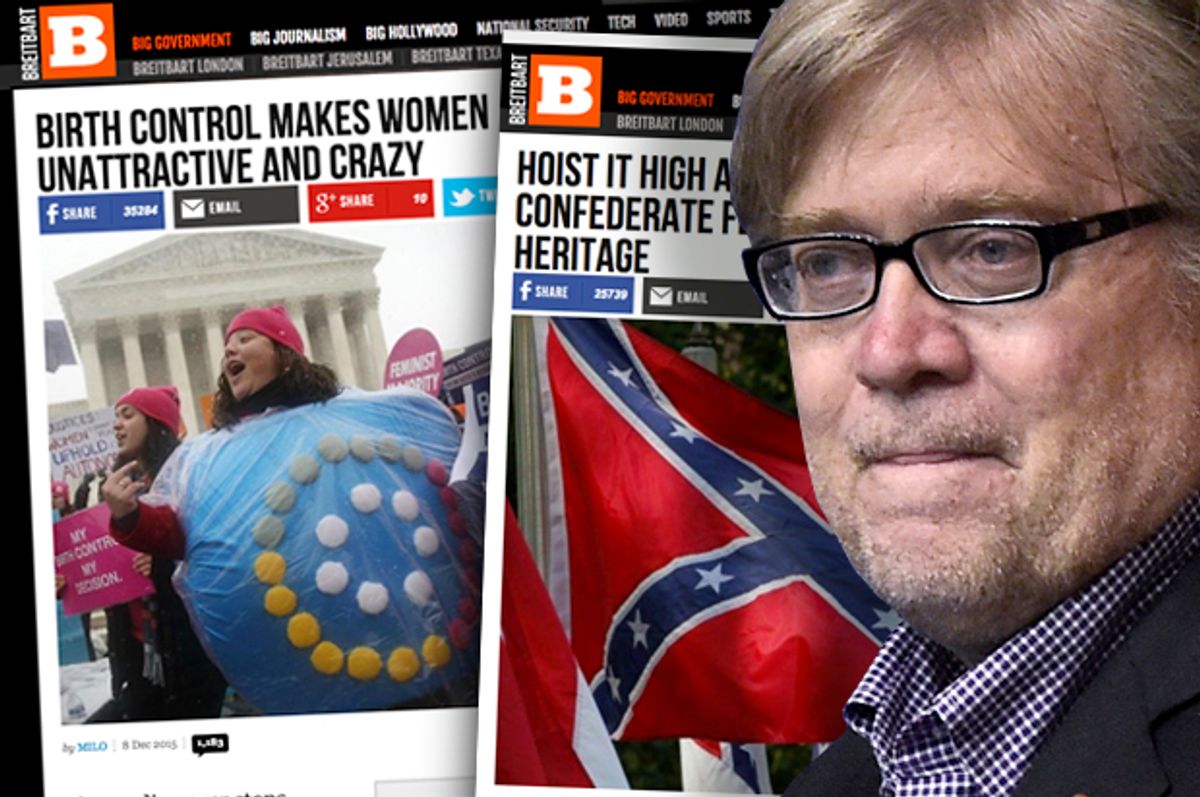As President-elect Donald Trump shrugs at criticisms over his choice of self-described “alt-right” firebrand Steve Bannon as his senior policy adviser, some companies are suddenly being touchy about their advertisements appearing on Breitbart.com, the far-right website that Bannon led until his move into Trump Tower in August.
Others, however, don’t seem to mind having their brands positioned next to articles like one published recently falsely claiming that “millions” of people illegally voted in the last presidential election.
While the hard-right news and commentary site isn’t peddling porn, gambling or other types of content that would make typical advertising buyers cringe, it is one of the most widely read publishers of misogynist, anti-Semitic, anti-LGBT, fat-shaming and other hateful content.
Despite a retreat by some companies who have moved to get their brands off of the website, others, including German automaker BMW, Chipotle Mexican Grill, Dell computers and Chase bank continue to bring revenue to the site as of Tuesday. Part of the issue is that many companies aren’t policing where their automatically delivered ads are appearing.
Others don’t seem to care.
For example, Japanese automaker Nissan recently defended its advertising on the site, which is widely perceived to be stoking fires of white-nationalist intolerance. “The placement of Nissan advertising is not intended to be a political commentary and there are no plans to change the advertising mix at this time,” the company said in a statement to Bloomberg.
That’s a far cry from the response from Kellogg.
The U.S. food giant said Tuesday it was blacklisting the site following a recent audit of where its advertisements have been appearing online, citing concerns over affiliation with sites that “aren’t aligned with our values as a company.” Kellogg joins insurer Allstate, smart-thermostat maker Nest Labs, IT services provider EarthLink and others that have already moved to prevent their ads from appearing on Breitbart.com, according to Digiday.
For companies that want to avoid their brands popping up next to headlines like “The Confederate flag proclaims a glorious heritage,” the massive automated digital advertising industry doesn’t make it easy.
Instead of more lucrative banner and native digital advertising, Breitbart.com relies on Google’s massive but more pedestrian AdSense ad network, which includes ads that follow specific users online based on what Google knows about them. This means that without adequate policing, many companies wouldn’t know that their ads are showing up next to content that might conflict with their values.
Most simply put their trust in Google’s automated system to deliver ads only to websites that fall into the category of generally acceptable content. Breitbart might be considered hateful, but it also garnered 19.2 million unique visitors last month, a rise from 13 million in the same month the previous year, according to ComScore. That’s not The New York Times traffic, but it's enough to make AdSense a significant revenue stream for the website.
Meanwhile, the popularity of automated digital advertising delivery is growing, which heightened the need for companies to pay more attention to where their ads are going. Last year programmatic digital ad spending generated $17.5 billion in revenue and represented 65 percent of total digital display ad spending in the U.S., a spike from $11.6 billion and 55 percent a year earlier, according to market researcher eMarketer. This year programmatic ad spending is expected to jump to $25.2 billion, capturing 73 percent of total U.S.-based digital display and spending.
Some digital activists are taking measures into their own hands to ensure that companies are at least aware of the website content that they’re promoting, giving them a chance to deploy efforts to blacklist sites they deem questionable. Sleeping Giants, a recently formed Twitter account, has been tracking ads appearing on Breitbart.com since Nov. 16, and it’s encouraging people to put pressure on companies whose advertisements are showing up on the site.
Whether this effort makes any difference to Breitbart.com’s revenue might never be known publicly. But if you notice fewer big brand names appearing in the Google’s AdSense boxes next to Breitbart articles inflaming anti-Muslim sentiment, you’ll know why.

Shares